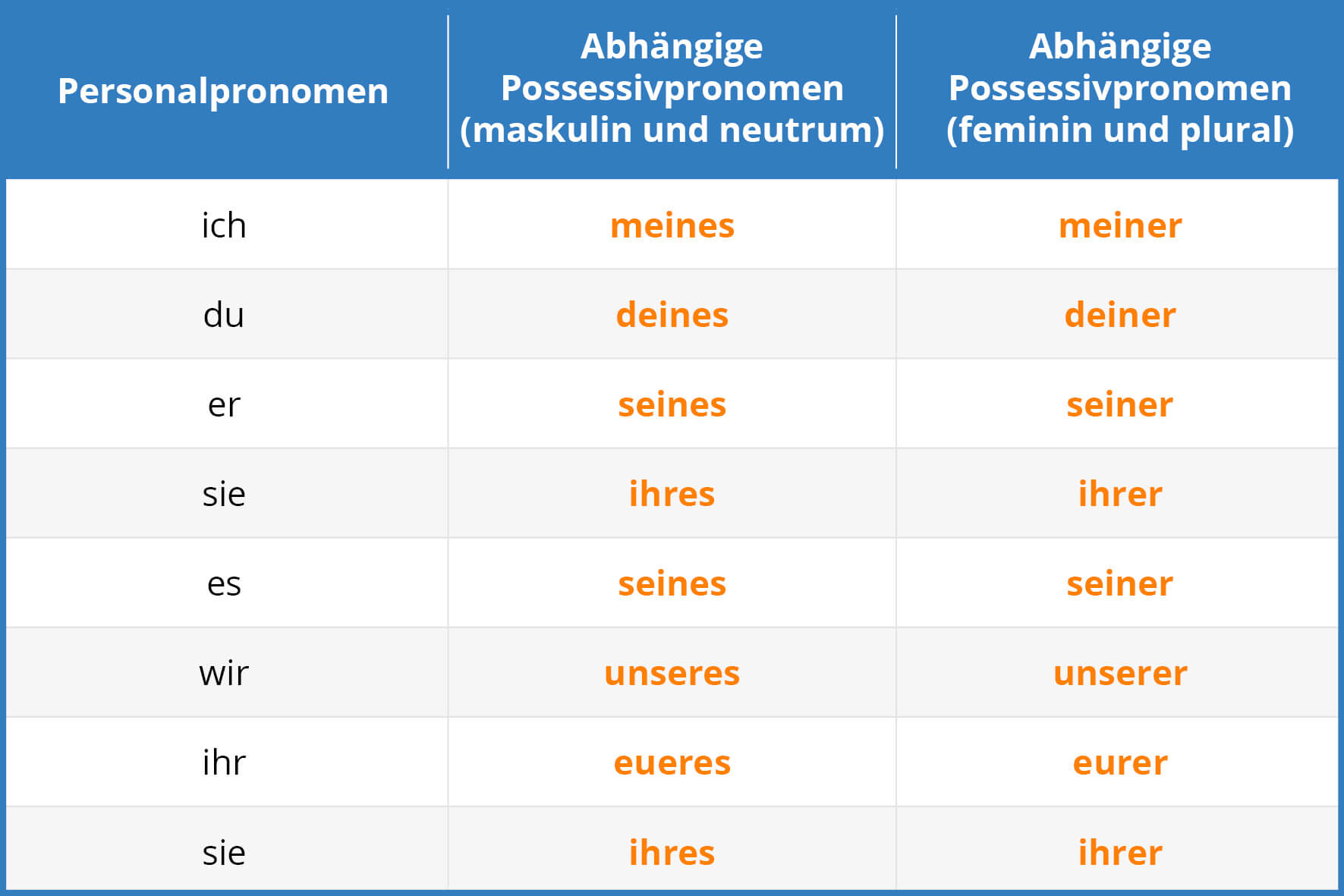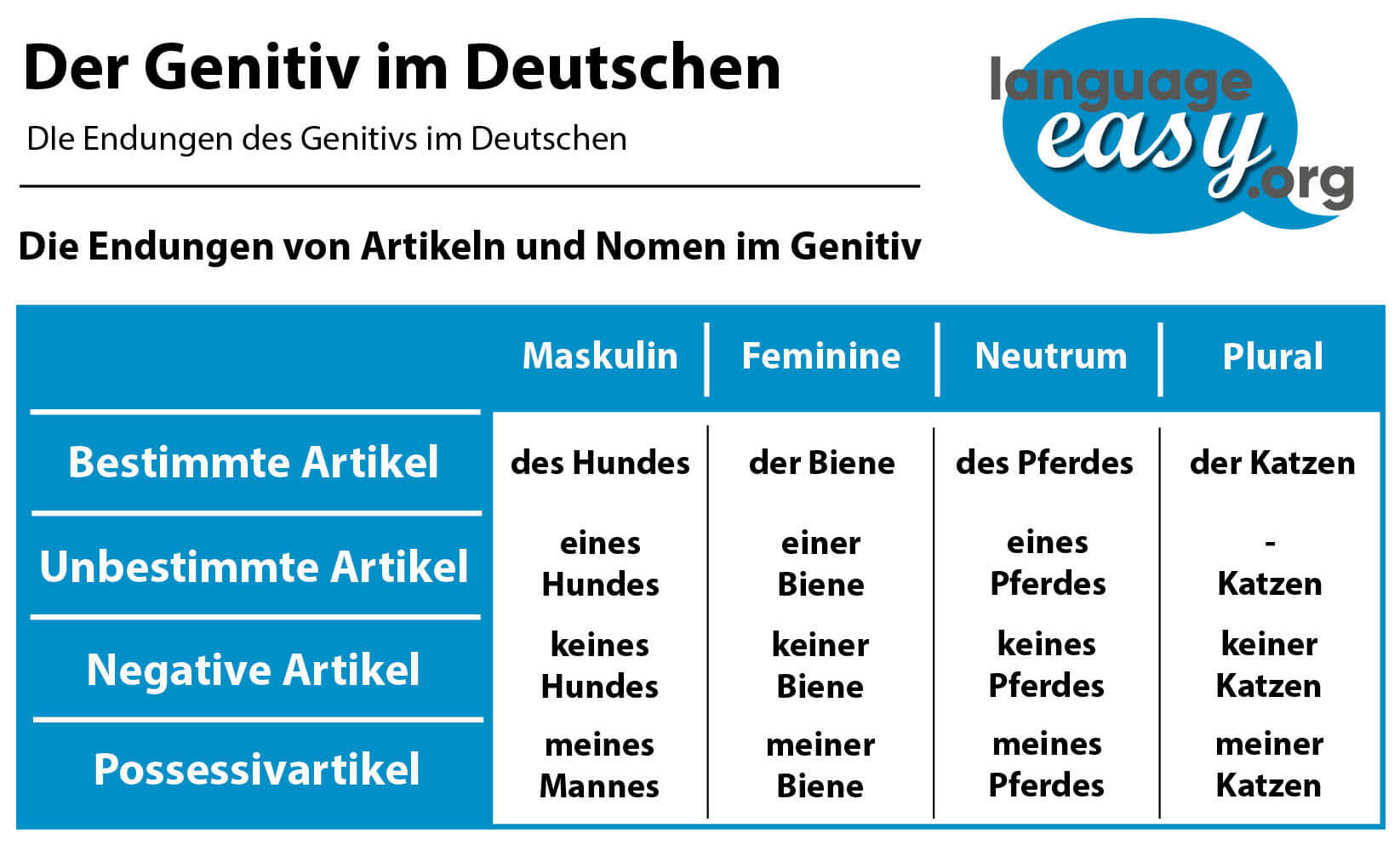The German Genitive
Der Genitiv im Deutschen – Erklärungen und Beispiele
The German Genitive – Summary
Zusammenfassung
A noun is in the genitive case when it is a attribute of another noun or when it indicates possession. German usually use the question “Wessen?” to determine the genitive element of a sentence.
- “Der Hund der Familie liegt hier.”
- “Das Auto des Fremden parkt hier.”
- “Das Fenster des Hauses ist kaputt.”
There are three types of declension for the genitive, which are indicated by the article and the wordending.
- (e)s-Declension(“das Pferd – des Pferdes, der Hund- des Hundes”).
Nearly all neutral and masculine nouns in genitive are part of this declension. When nouns end with “-s, -ß, -x, -z, -tz” the “e” has to be used.
- (e)n-Declension (“der Treue – des Treuen”).
Especially masculine nouns in genitive with the endings “-e, -ant, -ent, -ist” are part of this declension. The “e” is left in nouns ending with “-e, -el, -er” or in nouns ending in vowels.
- Declension without endings (“die Frau – der Frau”).
Here belong all the female nouns in genitive. In plural, always the article “der” is used and the noun is written as it would be in nominative.
Welcome to language-easy.org! Well, as you have clicked on this article, I suppose that you want to know everything about a basic element in German grammar – The German genitive. Of course, most of you have heard of this case, as it also exists in the English language. However, the construction of the forms of German genitive is completely different to the English one. Well, although this German case might be a little bit complicated, you have to be conscious that it is of crucial importance to express possession and other things.
In the following, I’d like to give you a short description of the German genitive and also talk about its correct usage. Furthermore, it is important to mention the special declension of pronouns in the German genitive.
By the way, in case you’d like to have some additional information about German conditional clauses, just have a look at this article on Wikipedia. Hopefully, it will provide you with all the background information that you need.
And now, let’s not lose too much time and come to the first part of this article and talk about what the German genitive case actually is. Auf geht’s!
Description and Usage of the German Genitive
Beschreibung und Anwendung des Gentiiv im Deutschen
Now, we come to the first topic of this article about the German genitive. So, I’d like to give you a short description of the German genitive. Please, try to keep this description in mind – it is always useful to know what we are actually talking about.
The German genitive case indicates possession. Whereas in the English language you use an “-‘s” or the preposition “of” to show position, in German you add “-es” or “-er” to dependent possessive pronouns.
Well, in German we use the genitive after certain prepositions, verbs and adjectives. Furthermore, we can use the question “wessen” (whose) to find the German genitive case. Unfortunately, asking this question to find the German genitive does not make too much sense to English speakers. So, I’d like to show you some more ways to recognize the German genitive.
- First, the German genitive, as already mentioned, indicated possession.
“Das ist Philip, mein Bruder.” - Second, it also comes with certain propositions, like “wegen”, “trotz” and “anstelle”.
“Wegen Philips Hund, ist mein Strumpf kaputt.” - And third, the German genitive occurs after certain verbs as a genitive object.
“Philip freut sich seines Hundes wegen.”
So, after clearing up the basics about the German genitive, let’s come to the next point of this article and talk about the declension of pronouns in the German genitive.
The Declension of Pronouns in the German Genitive
Die Deklination von Pronomen im Genitiv
Now, we come to another important topic in the context of the German genitive, the declension of pronouns in this grammatical case. Well, keep in mind that we only use dependent possessive pronouns in the genitive case. Furthermore, you should always remind that personal pronouns and independent possessive pronouns cannot be put into the German genitive. So, in the following table I’d like to give you an overview about the mentioned dependent possessive pronouns and their genitive endings.

Of course, you can observe clearly the endings “-es” and “-er”, as already mentioned in the short description of the German genitive above.
Exercises
Übungen
Finally, we have reached the last part of this article where you can prove the German skills you have just learned. In the following you will see some phrases that you should complete with the correct terms. Once you have filled all the gaps, just click on the “correct” button and you can see your errors and the correct results. Good luck and… auf Wiedersehen!



